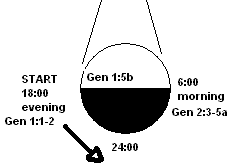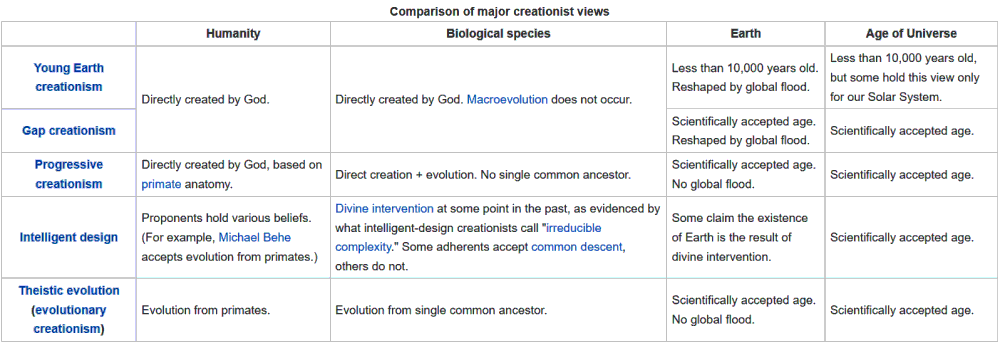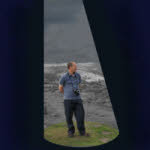Genesis has a lot of criticism thrown at it, but does the creation story fail scientific study?
If Genesis can be studied logically, without immediately rejecting it, then we begin to see things within the text that scientists can agree upon.
This article aims to look at the problems with Genesis chapter one in the Bible and seeks, if possible, for a scientific interpretation of Genesis.
Here I aim to show that the creation account in the book of Genesis is historically accurate.
Table of Contents menu
Table of Contents:
1. God made everything!
Let’s take a look at the sequence of events in the Biblical account of the creation of the world and ask “Does Genesis fail scientific study?” Is there any science behind it?
In the beginning God created the heavens* and the earth.”
Genesis 1:1 NIV
The word ‘heavens*’ in Hebrew is ‘שָׁמַיִם’ (sha.ma.yim) which means 1
1) Heaven, heavens, sky.
1a) Visible heavens, sky.
1a1) As the abode of the stars.
1a2) As the visible universe, the sky, atmosphere, etc.
1b) Heaven (as the abode of God).
The word occurs about ~395 times in the Bible.
So this could be like a title or introductory statement:
“In the beginning God made everything!“

2. A formless ball – does that fail scientific study?
Evolutionists would surely agree with the first part of this statement:
Now the earth was formless and empty, darkness was over the surface of the deep, and the Spirit of God was hovering over the waters.”
Genesis 1:2 NIV
God made the earth, firstly without any vegetation, or inhabitants.
It was a sphere consisting of one huge ocean, presumably, spinning on its axis, in dark, empty space.
3. Light and darkness created
And God said,
Genesis 1:3-5 NIV
“Let there be light,” and there was light.
God saw that the light was good, and he separated the light from the darkness.
God called the light ‘day,’ and the darkness he called ‘night.’
And there was evening, and there was morning–the first day.”
God spoke and there was light.

For the light to be separated from the darkness, the light would have to come from one point.
The picture shows light shining from one point upon the earth’s surface and darkness on the other side.
Does Genesis fail scientific study when it is saying that light and darkness are divided on the Earth?
Some say that this darkness is talking about Satan, but that cannot be right, because God calls the light ‘day’ and the darkness ‘night’.
The earth spinning on its axis will create day and night upon the earth.
Some believe that this light source was given until the creation of the sun, others believe that the sun itself gave the light – (this is discussed later).
Does Genesis fail scientific study?
4. A day 24 hours in Genesis – does Genesis fail scientific study?
So, why describe it as:
And there was evening, and there was morning–the first day.”
Genesis 1:5 NIV
We would say, “There was morning, and there was evening.” The answer is that the Jews take their day from sundown to sundown.
When they start their Sabbath, it starts on Friday sundown to Saturday sundown.
So imagine the sequence of events, as if viewed from one point on the globe.
Remember the Jewish day starts at sundown, so we are going to start at 6 pm.

Day 1 in Genesis will run from the first evening to the next evening:
- God had just created the earth, and our clocks would say: 18:00 hours, the equivalent of the evening.
- Then 12 hours later, at 6 in the morning, we would have seen a rather sudden morning, when God said: “Let there be light,” and there was light.
- Then 12 more hours would complete the first day.
Does Genesis fail scientific study when it states that it was one day, 24 hours?
The language doesn’t appear to be figurative.
It seems to be all factual.
So when God says:
And there was evening, and there was morning–the first day.”
We have got no reason to doubt that it means more than one day.
It is so specific: evening, morning, the first day.
This is what changed me from a fuzzy belief of evolution and creation somehow sitting uncomfortably together, the very specific 24 hours.
If we believe that God could produce something from nothing and we believe that he could do that one day at a time, does Genesis fail scientific study because some can’t cope with that scenario?
The Bible reinforces the twenty-four hours and days by repeating this in Exodus:
For in six days, the Lord made the heavens and the earth, the sea, and all that is in them, but He rested on the seventh day.”
Exodus 20:11 NIV
See this article on Creation days 2 and 3 where the atmosphere has one complete day devoted to its creation. Vegetation appears on the following day.
See the article on the Creation of the sun moon and stars where these are created on the 4th day which is illogical to even the most historic peoples. Why does God say that they were created on that day, is Genesis scientific?
See the article: According to their kinds – Does science threaten Genesis?
5. Comparison of major creationist views
If you are one of those people who don’t look into things very deeply you probably would be amazed at the number of different ways to interpret the first two chapters of Genesis.
The chart below nicely lays out the different views:

Below is the wording from the picture above, plus additional information: 3
Young Earth Creationism: Humanity and biological species directly created by God and Macroevolution 4 does not occur. The Earth and universe are less than 10,000 years old and there had been a global flood. Some people in this group just believe that the age only belongs to our Solar System.
Genesis is interpreted literally. See Creation Ministries International.
Gap Creationism: Also known as Ruin-restoration Creationism, Restoration Creationism, or the Gap Theory. Humanity and biological species are directly created by God and Macroevolution does not occur. Scientifically accepted age of the Earth, but there was a global flood. Scientifically accepted age of the Universe.
There are six literal 24-hour days, but there was a huge gap of time between two distinct creations:
“In the beginning, God created the heavens and the earth. The earth was without form and void, and darkness was over the face of the deep.”
Then there was a gap, then: “And the Spirit of God was hovering over the face of the waters. And God said, ‘Let there be light,’ and there was light.” This was when the present biological species and humanity were created.
Progressive Creationism: Humanity is directly created by God based on primate anatomy. Biological species are directly created by God plus evolution, but no single common ancestor. Scientifically accepted age of the Earth, but no global flood. Scientifically accepted age of the Universe. Creation occurred in rapid bursts by divine intervention in which all “kinds” of plants and animals appear in stages lasting millions of years. The archaeological record shows that “species do not gradually appear by the steady transformation of its ancestors; [but] appear all at once and fully formed.” It rejects macroevolution.
Day-age creationism: Six ‘days’ referred to in Genesis thousands to billions of years each and attempts to reconcile Genesis with modern science. Scientifically accepted age of the Earth and Universe.
Intelligent Design: Regarding humanity, proponents hold various beliefs. For example, Michael Behe accepts evolution from primates.
Regarding biological species, there was Divine intervention at some point in the past because they see ‘irreducible complexity’. But all say that some form of Intelligence would be required and not just natural selection. Some accept common descent others don’t. Scientifically accepted age of the Universe.
Theistic Evolution or Evolutionary Creationism: Humanity: Evolution from primates and biological species from a single common ancestor. Scientifically accepted age of the Earth and the Universe, but no global flood. God’s method of creation was to cleverly design a universe in which everything would naturally evolve. Creation in Genesis is not literal, but rather an allegory.
See the article: God named day, night, sky, land, sea and stars but not others – why?
God created Adam a mature man, so why would he not be able to speak, read and write, see this article: Could early man write? Were they really just oral traditions passed on?
See the article: The Garden of Eden was it a parable or real?
6. God gives proper independence but not absolute independence
God gives his creation what Colin Gunton calls Selbständig-keit or a ‘proper independence.’
‘God Creates the World (Genesis 1:1-2:3)’ Theology of Work Project 5
This is not the absolute independence imagined by the atheists or Deists, but rather the meaningful existence of the creation as distinct from God himself.
This is best captured in the description of God’s creation of the plants.
“God said, ‘Let the earth put forth vegetation: plants yielding seed, and fruit trees of every kind on earth that bear fruit with the seed in it.’ And it was so” (Genesis 1:11).
God creates everything, but he also literally sows the seed for the perpetuation of creation through the ages.
The creation is forever dependent on God—“In him we live and move and have our being” (Acts 7:28)—yet it remains distinct.
This gives our work a beauty and value above the value of a ticking clock or a prancing puppet.
Our work has its source in God, yet it also has its own weight and dignity.”
Historically Christians have unwittingly related the Bible’s term ‘kinds’ to the term ‘species’ which is wrong.
In my early days of being a Christian I must have asked myself ‘Does Genesis fail scientific study?’ my answer was that I embraced Evolution as well as Genesis, but it was an uneasy alliance.
I saw the Genesis days as being epochs of time and not 24 hours.
But in the end, it was because of the specific wording in Genesis that I could not honestly hold onto the belief that the days meant millions of years.
I think that whether you are a believer or not, the first few words in Genesis are so concise, so powerful, so majestic:
In the beginning God created the heavens and the earth.”
Genesis 1:1 NIV
What clarity!
“In the beginning GOD.” What power and authority are in those four words!
So my answer now to: ‘Does Genesis fail scientific study?’ is ‘No it doesn’t fail scientific when you believe that God can create something out of nothing!’
See a detailed article on: ‘Scientific inaccuracies, and other supposed Bible errors‘
7. Frequently asked questions (FAQ)
Are Christians supposed to believe in science?
Science should look at all the facts and suggest how a particular object operates and functions.
This experiment must be held lightly as further studies may prove that alternative theories are more correct.
The problem occurs when people take scientific theories as being 100% provable facts.
So, yes Christians can trust science where that science is used correctly.
Many scientists believe in God and the Genesis account in the Bible.
Can science and Christianity coexist?
Both scientists and Christians should believe in seeking the truth and discovering new things.
Therefore, there should be no conflict. But the problem is when scientists refuse to be open to looking at Christian solutions to a particular subject – purely because it is Christian.
In other words, ‘anything but God‘.
Also, Christians should not cast aside Genesis because scientists have chosen a popular theory which has not been proven.
References – open in new tabs:
Step Bible ↩
Macroevolution is the changes from molecules to man. See an article covering this: Creation or Evolution do we have to choose? ↩
‘God Creates the World (Genesis 1:1-2:3)’ Theology of Work Project ↩

